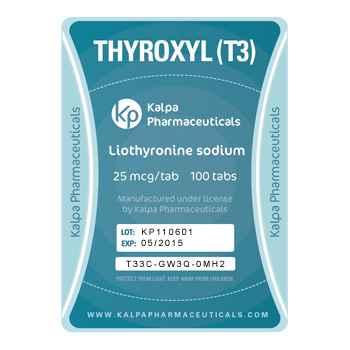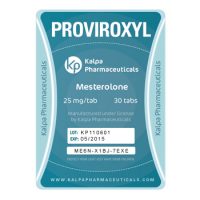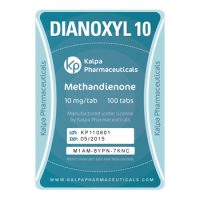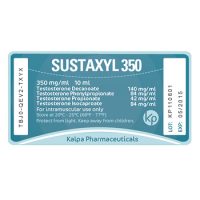Description
Thyroxyl (T3) by Kalpa Pharmaceuticals is used as a treatment for an underactive thyroid (also called hypothyroidism). This can occur because of treatment with certain medicines, or if the thyroid gland has been removed as a result of surgery. The main ingredient in this medication is a synthetic hormone (sometimes known as T3), which treats sensitivity to cold, loss of hair, dry skin and other symptoms of hypothyroidism, by replacing the natural thyroid hormone (T3 Liothyronine). It is also used to treat include infertility, an enlarged thyroid (called a goiter), Hashimoto’s thyroiditis and other conditions. This medication should not be used to help with weight loss.
Thyroxyl Kalpa Pharmaceuticals Dosage
Thyroxyl is a very strong and effective syntetic throid hormone an done should be very careful about dosage he/she uses. It is highly advised that one should start using T3 Liothyronine at low low doses and star increasing very slowly. Most of the bodybuilder starts to use Thyroxyl by taking a 25mcg tablet andincrease this dose by one tablet every three or four days. Using a dose higher than 100-mcg/day is really dangerous and not advised. Daily dose that will bi taken should break into smaller doses and should not be taken all at once. This way the usage of the drug will be more effective.
Taking Thyroxyl more then 6 weeks is can be dangerous and not advised. One should avoid to use this drug for at least two months after a 6 week using period. Those who take high doses of this drug for a long time of period can suffer from a cronic thyroid insufficiency. This could lead one to use thyroid medicatin for rest of his/her life. It is also important that the dosage is reduced slowly. A physician must be consulted berofe starting to use of Thyroxyl, to be sure that there is no thyroid hyperfunction exists.
Thyroxyl (T3) Weight Loss Side Effects
Thyroxyl may cause a number of side effects with differing severity levels. Commonly reported non-serious side-effects associated with Thyroxyl include headaches, vomiting, diarrhea, increased bowel motility, upset stomach, stomach cramps, nervousness, weight loss, insomnia-related sleep problems, excessive sweating, enhanced appetite, fever, and altered heat sensitivity.
The common severe side-effects associated with Thyroxyl are tremor, arrhythmia, tachycardia, angina pectoris, congestive heart failure (CHF), irritability and mood changes, hyperthyroidism (with chronic usage), change in menstrual cycle pattern, and shock.




